Seleucid dynasty facts for kids
| {{{surname}}} |
|||
|---|---|---|---|
| Country: | Quick facts for kids Syria, Persia |
||
| Titles: | * Lord of Asia | ||
| Founder: | Seleucus I | ||
| Dissolution: | 64 BC | ||
The Seleucid dynasty was a powerful family of Greek rulers. They were from Macedonia. This family ruled a huge empire called the Seleucid Empire. It was located in West Asia during a time known as the Hellenistic period.
The empire was started by Seleucus I Nicator. He was a general who served Alexander the Great. After Alexander died, his vast empire was divided among his generals. These generals were called the Diadochi (meaning "Successors"). The Seleucid Empire became a major center for Hellenistic culture. This means it spread Greek ideas and ways of life. Many people from Greece moved there. They became important leaders under the Seleucid kings.
After Seleucus I, his family kept the empire strong. It became a leading Greek power in West Asia. The empire was at its biggest under King Antiochus III. But later, the empire faced many problems. It lost land and had many civil wars between family members. Eventually, the Seleucids ruled only a small part of Syria. The Roman Empire took over their land in 64 BC. This was done by Pompey the Great.
History of the Seleucid Empire
How the Empire Began
Seleucus was born around 358 BC. He was a brave officer in Alexander the Great's army. He led a special group of soldiers called the "Shield-bearers."
When Alexander died in 323 BC, his empire was split up. Seleucus became the governor, or satrap, of Babylon in 321 BC. Another powerful general, Antigonus, forced Seleucus to leave Babylon. But Seleucus got help from Ptolemy, the governor of Egypt. Seleucus returned to Babylon in 312 BC. This year is often seen as the start of the Seleucid Empire.
Seleucus then conquered more lands. These included Persia and Media. He even made a peace deal with the Indian King Chandragupta Maurya. Seleucus won important battles against other generals. He defeated Antigonus in the Battle of Ipsus in 301 BC. He also defeated Lysimachus in 281 BC. Sadly, Seleucus was killed later that year. His oldest son, Antiochus I, became the next ruler in 281 BC.
Seleucid Rulers
| Portrait | King | Time as King (BC) | Wife(s) | Notes |
|---|---|---|---|---|
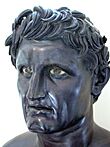 |
Seleucus I Nicator | Satrap 320–315, 312–305 BC King 305–281 BC |
Apama | Started the Seleucid Empire. |
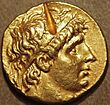 |
Antiochus I Soter | co-ruler from 291, ruled 281–261 BC | Stratonice of Syria | Ruled with his father for 10 years. |
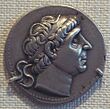 |
Antiochus II Theos | 261–246 BC |
|
Berenice was an Egyptian princess. Laodice I had her and her son killed. |
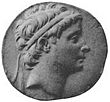 |
Seleucus II Callinicus | 246–225 BC | Laodice II | |
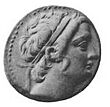 |
Seleucus III Ceraunus (or Soter) | 225–223 BC | Was killed by members of his own army. | |
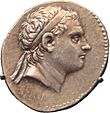 |
Antiochus III the Great | 223–187 BC |
|
Brother of Seleucus III. The empire reached its peak under him. |
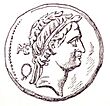 |
Seleucus IV Philopator | 187–175 BC | Laodice IV | He married his sister. |
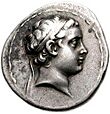 |
Antiochus (son of Seleucus IV) | 175–170 BC | Ruled with Antiochus IV. | |
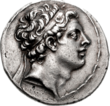 |
Antiochus IV Epiphanes | 175–163 BC | Laodice IV | He also married his sister. |
| Antiochus V Eupator | 163–161 BC | |||
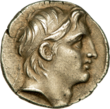 |
Demetrius I Soter | 161–150 BC |
|
Son of Seleucus IV. |
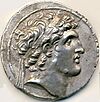 |
Alexander I Balas | 150–145 BC | Cleopatra Thea | Claimed to be son of Antiochus IV. |
 |
Demetrius II Nicator | first reign, 145–138 BC | Cleopatra Thea | Son of Demetrius I. |
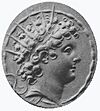 |
Antiochus VI Dionysus (or Epiphanes) | 145–140 BC? | Son of Alexander Balas. | |
 |
Diodotus Tryphon | 140–138 BC | A general who took the throne after killing Antiochus VI. | |
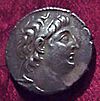 |
Antiochus VII Sidetes (or Euergetes) | 138–129 BC | Cleopatra Thea | Son of Demetrius I. |
 |
Demetrius II Nicator | second reign, 129–126 BC | Cleopatra Thea | Killed because his wife Cleopatra Thea wanted him dead. |
 |
Alexander II Zabinas | 129–123 BC | A rival king. | |
 |
Cleopatra Thea | 126–121 BC | A powerful queen who ruled alone for a time. | |
| Seleucus V Philometor | 126/125 BC | Killed by his mother, Cleopatra Thea. | ||
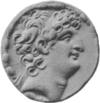 |
Antiochus VIII Grypus | 125–96 BC |
|
|
 |
Antiochus IX Cyzicenus | 114–96 BC |
|
|
 |
Seleucus VI Epiphanes Nicator | 96–95 BC | ||
 |
Antiochus X Eusebes Philopator | 95–92 BC or 83 BC | Cleopatra Selene I | |
 |
Demetrius III Eucaerus (or Philopator) | 95–87 BC | ||
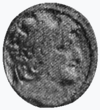 |
Antiochus XI Epiphanes Philadelphus | 95–92 BC | ||
 |
Philip I Philadelphus | 95–84/83 BC | ||
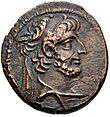 |
Antiochus XII Dionysus | 87–84 BC | ||
| Cleopatra Selene or Seleucus VII | 83–69 BC | |||
 |
Antiochus XIII Asiaticus | 69–64 BC | ||
| Philip II Philoromaeus | 65–63 BC | The last Seleucid king. |
See also
- List of kings of Persia
- List of Syrian monarchs
 | Shirley Ann Jackson |
 | Garett Morgan |
 | J. Ernest Wilkins Jr. |
 | Elijah McCoy |

